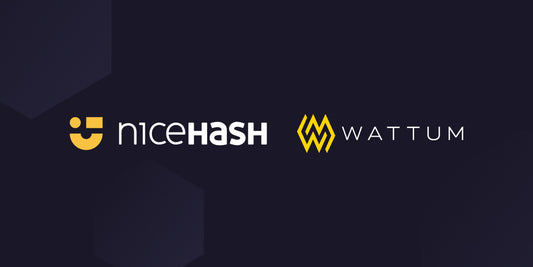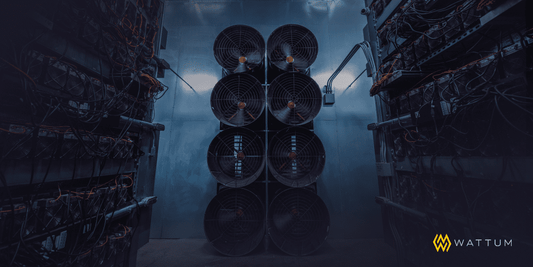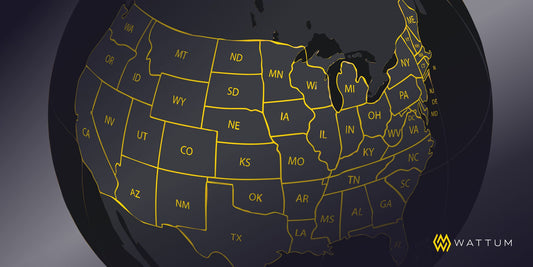Bitcoin mining activity has skyrocketed over the last few years, and along with it the demand for cheap and reliable hosting services. Of course, the cost of electricity and the efficiency of your rigs are what determine your profitability when it comes to mining, so it’s only natural to seek out the most cost-efficient option to help maximize potential profits.
While cost efficiency is obviously desirable, there’s often a good reason why you’re paying less, and it boils down to what you’re paying for.
Over the years, Wattum has worked with a number of different third-party facility operators to host our own self mining operations, as well as the operations of our customers. Finding a facility that charges $0.06/kwh while others are on the upper end of $0.09/kwh can feel like hitting the jackpot, so we’ve decided to share our experience with such facilities in order to show you that gambling is still the most famous risky business.
For the purpose of this article, we will affectionately refer to such facilities as “petapet” facilities; like your average petting zoo or farm, such facilities are on the cheaper end, but the conditions often require you to wear knee high rubber boots. Our hope is that this will allow you to better align your expectations while providing a glimpse into the next phase of Wattum’s hosting services as we step away from working with third party operators.
Expectations vs. Reality
Petapet /pet - ə - pet/ - an unreliable crypto mining hosting facility that runs its operations based solely on their advertisement of providing the lowest available price per kilowatt, in addition to a barrage of false advertisements.
Working with third party operators means you’re agreeing to work to their standards of service, and unless you’re a match made in heaven, their standards are likely to differ from yours. This was often the case for us, where petapet facilities would recite their promise of high standards and best service practices, and then ultimately fail to live up to our expectations.
Now, when you think of the ultimate hosting or data center, you likely imagine large, sterile server rooms, with tidy wiring, adequate cooling, and many rack-mounted servers with flashing lights. However, if you’re thinking cost-efficient, this image quickly vanishes. It’s impossible to compare a petapet facility that charges $0.06/kwh with an enterprise-level one at $0.40/kwh - and by enterprise, we mean a facility with all the extra bells and whistles that aren’t really necessary to efficiently mine, such as air conditioning or humidity control when ASIC miners are already made to withstand extreme temperatures, and are typically cooled using large intake and exhaust fans.
The higher the price, the higher the quality of service you get. And don’t get us wrong, it’s not that we walked into an agreement with a petapet facility expecting bells and whistles. We didn’t even expect bells. But there are certain industry standards that are standards for a reason. On-site tech support, a clean facility, proper ventilation and cooling, and trained and dedicated on-site staff that perform regular maintenance and troubleshooting - these are all things necessary to successfully mine, and directly affect overall uptime and the lifetime of your machines.
While you’d be hard pressed to find a facility that charges $0.40/kwh, the difference between a $0.06/kwh and a $0.09/kwh facility is in itself significant.
What really goes down in lower cost facilities?
You don’t need to be 007 to know how lower cost facilities operate and what the overall treatment of your miners is like inside - it’s visible to the naked eye.
We’ve had firsthand experience with such facilities not only abroad, but in the United States as well, and our expectations were the same: low cost electricity, 99% uptime, and ideal hardware upkeep through routine maintenance and monitoring, along with tech support available 24/7. However, the reality is that we more often than not received barebones services, essentially consisting of the machines being plugged in, and then fingers being crossed that nothing went wrong.
Petapets in New York hosted our machines in poor conditions and allowed them to be exposed to outside elements via open air cooling intakes. The lack of air filtration resulted in visibly dirty machines that were not regularly cleaned, despite this being an industry standard due to the occasional not-so-uncommon dirt, dust, pollen, and even small bug that can get inside your units and on the hashboards thanks to your miner’s filtration system. Had any of our clients decided that they wanted to sell their units, they would have had to put down another $20,000 per 100 units just to have them cleaned.


In nearby New Jersey, a petapet facility decided one day that it was time to sell the building that they were leasing out to miners. They breached their agreements with miners that relied on them, and subsequently kicked them out.
Call it an East Coast Curse, but Pennsylvania has its own fair share of petapet horror stories to tell. One petapet became publicly traded and, shortly thereafter, kicked out all of their hosting clients without warning. Another soon-to-be-heritage-site in Pennsylvania is currently operating a hosting center in a residential zone, even though it’s required by law to run such operations in industrial zones in order to avoid being shut down.
Petapet facilities in Nevada are notorious for signing multi-year locked lease agreements for the lowest possible price per kwh, and are then unable to keep up with payments when unprecedented market factors take place, such as a hike in electricity prices as a result of Russia’s invasion of Ukraine. As a result, they are unable to honor their agreements and cut their own power, which then leads to the utility to cut their power due to overdue bills (which the petapet could not make because, by the time they found out their original $0.06/kwh agreement was actually costing them $0.08/kwh thanks to a variable rate, which we explain in more detail below, they face a bankruptcy or sell-off situation). Now the petapet is shut down and miners are forced to move. And the horror story doesn’t end there: in some cases, petapets have sold client equipment without their knowledge, or have used it for self mining in order to make up their past due bills.
Unfortunately, a high standard of service and operations based on integrity and expertise are not so common. More and more petapets are beginning to pop up around the country, with some pushing their price point to $0.09/kwh while providing $0.06/kwh services; Texas has become a hotbed for such facilities, likely due to their governor’s open armed-welcome as TX strives to be crowned the world’s newest crypto mining capital.
What’s more, facilities on the lower end of the per kilowatt price point that do stay open don’t make enough to budget reliable on-site staff that can be available around the clock. The combination of these issues eventually results in lower hashrate (due to overheating as a consequence of poor ventilation and lack of professional maintenance) and a real world uptime of about 80%, as opposed to the expected 95% or more. Minor issues that could have been resolved with a simple reboot aren’t addressed in a timely manner as there’s a good chance there’s no one there to address it, leading to increased downtime and lost profits, in addition to an increased risk of being shut down and clients being cut off.
Yes, there are some middlemen in crypto
While Bitcoin is of course loved and cherished for being decentralized and removing middlemen in transactions, third-party petapet facilities do act as middlemen between you and the power grid operator (and between us and our clients, for that matter).
This means your trust in them extends to their commitment to paying their electric bills and maintaining company integrity. Makes sense, right? Well, Wattum has firsthand experience with petapets in New York defaulting on their utility payments, causing them to be cut off and shut down, and leaving us and our clients stranded and looking for alternatives.
As a result of these issues, lower cost facilities typically don’t operate for more than 2 years before they go bankrupt and are forced to shut down, or get bought out by a publicly traded company. This is in large part due to the fact that most energy providers refuse to sign contracts for under 10 MW of power. If you can’t secure a large enough contract, they’ll sign you at a variable rate, meaning, despite being oh so desirable at $0.06/kwh, the facility rate can shoot up to $0.20/kwh during peak months, certain hours of the day, and based on the season and overall grid congestion. As a result, their average annual cost can end up exceeding what they charge their clients, and they’ll even end up raising their prices. Jackpot!
We’ve witnessed facilities get shut down for things that, as a client, you really shouldn’t have to think about (like operating in a residential zone when legally required to operate such centers in industrial zones). Inexperienced ownership or a fingers crossed business model, we’ll let you be the judge.
Understanding operational pricing
Are these risks really worth a $0.03/kwh price difference? If you were to take all of the aforementioned factors into consideration and base them on the hosting of 100 units, and let’s say we safely assume some of these units will be removed from the equation due to poor hosting conditions or other impediments, you can discern that by paying roughly 23% more, you could be getting approximately 17% higher uptime during your first year of mining.
What’s more, during years 2 and 3, the value in paying $0.09/kwh becomes clear as you’re now getting that 17% higher uptime by paying only about 6% more. To prove we’re not just throwing numbers around, take a look at the estimated operational breakdown based on our data below:
Year 1
| Uptime | 80% | 97% |
| (100 units) Gross BTC Mining Revenue | 13.4568 | 16.3154 |
| Hosting Fee | $0.06 | $0.09 |
| Utility Electric Fee | $0.05 | $0.05 |
| Gross Profit | $0.01 | $0.01 |
| Highly Qualified On-site Staff | $0.00 | $0.02 |
| Regular Facility Upkeep | $0.00 | $0.01 |
| (100 units) Annual Hosting | $168,480 | $252,720 |
| (100 units) Annual Cleaning Fee | $20,000 | $5,000 |
| (100 units) Annual Replacement Fee | $37,500 | $12,500 |
|
Total Gross Mining Revenue (based on $40,000) |
$538,272 | $652,616 |
| Total Hosting Fee | $225,980 | $270,220 |
| NET PROFIT | $312,292 | $382,396 |
Year 1 & Year 2
| Uptime | 80% | 97% |
| (100 units) Gross BTC Mining Revenue | 26.9136 | 32.6308 |
| Hosting Fee | $0.06 | $0.09 |
| Utility Electric Fee | $0.05 | $0.05 |
| Gross Profit | $0.01 | $0.01 |
| Highly Qualified On-site Staff | $0.00 | $0.02 |
| Regular Facility Upkeep | $0.00 | $0.01 |
| (100 units) Annual Hosting | $336,960 | $505,440 |
| (100 units) Annual Cleaning Fee | $20,000 | $5,000 |
| (100 units) Annual Replacement Fee | $150,000 | $30,000 |
|
Total Gross Mining Revenue (based on $40,000) |
$1,076,544 | $1,305,232 |
| Total Hosting Fee | $506,960 | $540,440 |
| NET PROFIT | $569,584 | $764,792 |
So, some initial savings or peace of mind? Your call, judge.
Setting the standard
Without our own facilities and lacking the funds to build them out, Wattum has previously had to work with petapet facilities in order to grow and establish our business. However, this past reliance has admittedly caused our brand reputation to suffer.
Through years of experience accompanied by the not-so-occasional headache, we have learned that certain standards are non negotiable, and have utilized these lessons in the shaping of our future strategy. Having grown immensely and begun the construction of our own US-based hosting facilities, we will no longer be relying on petapet-standard infrastructure, land, or power grid operator contracts.
Our upcoming facilities, planned for New York, Georgia, Pennsylvania, and Virginia, are built to spec with maximum uptime and future proofing in mind, sparing no expense to ensure the expectations of our customers are met with the same level of service we would expect for ourselves.
In Portage, NY, we are constructing a hosting facility with expected capacity to reach 7.5 MW by Q3 2022, and are also preparing to go public with a new facility in Sylvester, GA in Q3 as well, launching with 10 MW and projected to reach 20 MW by September 2022. Both facilities are to be entirely owned and operated by Wattum and will employ diligently sourced on-site and remote teams.
We are swiftly hiring locally-based, highly qualified specialists that will provide the necessary operational and technical services, 24/7. Our new facilities will be priced at $0.09/kwh as we invest the price difference into the maintenance of our high level services and take out the middlemen for a truly reliable mining experience.
Working with third-party operators was often done at the expense of our customers and their mining operations, and we are committed to never paying such a price again. So, the next time you come across a $0.06/kwh petapet facility, think twice to avoid paying twice - and let our own gamble serve as a valuable lesson in what does and doesn’t work in crypto mining and hosting.



